Middle East
Unpacking Israel’s war on international humanitarian law | Israel-Palestine conflict News
On March 24, Israel struck a car in northern Gaza and killed Al Jazeera correspondent Hossam Shabat.
The 23-year-old is one of countless civilians – men, women and children – Israel has killed since launching what legal scholars describe as a “genocidal” war on Gaza.
Israel often justifies its killings by claiming that the targets are people sympathetic or affiliated with Hamas or other armed factions. This was the justification given for killing Shabat.
Israel also regularly destroys entire neighbourhoods and buildings, killing dozens – often hundreds – at a time, ostensibly to target a single Hamas operative.
For years, Israel has tried to justify these practices by employing lawyers to create shadowy quasi-legal concepts in the hope of establishing new, dangerous precedents, according to legal scholars and experts.
However, legal scholars told Al Jazeera that neither so-called “targeted killings” nor disproportionate attacks against civilians have any grounding in international law.
“Is there any semblance of law or legal justification for the war tactics Israel is using in Gaza? The simple answer is no. There isn’t,” said Heidi Matthews, assistant professor of law at York University in Toronto, Canada.
Setting precedents
On September 28, 2000, Palestinians across the occupied West Bank and Gaza began demonstrating against Israel’s ever-entrenching occupation in what became known as the second Intifada.
Israel’s repression of the Intifada quickly prompted Palestinians to mobilise and fight back.
Over the next five years, Israel launched what it named “targeted killings”, assassinating unarmed Palestinians.
Israel claimed that these targets could pose a threat to Israelis in the future because of their alleged membership in an armed faction.
“Israel … strips protection from civilians based on their views or perspectives,” said Noor Kilzi, a researcher with Legal Agenda, a nonprofit in Lebanon that advocates for legal reform and human rights in the Middle East.

Israel’s concept of targeted killings laid out a blueprint which the United States adapted during its “war on terror”, analysts told Al Jazeera.
“[In the early 2000s] Israel and the US changed their legal doctrines and implemented that as part of their military dogma,” York University’s Matthews told Al Jazeera.
“When it came to distinguishing between civilians and combatants… the US and Israel began to view [anyone as a target] based on their membership to a group,” she added.
According to the International Committee of the Red Cross, a person is only a legitimate target if they are directly engaged in armed combat at the time they are killed.
This means that suspected membership in an armed group is not a sufficient basis to assassinate someone.
Leiber’s legacy?
Throughout Israel’s war on Gaza, it has routinely dropped 2,000lb (900kg) bombs in densely populated residential areas, as well as systematically targeted schools, hospitals and displacement shelters.
Israeli officials justify these attacks by claiming that Israel is fighting a “just war” against barbarians. As a result, the ostensible goal of destroying Hamas outweighs minimising civilian casualties.
This is rooted partly in the philosophy of Francis Leiber, a 19th-century German American military theorist, who was tasked with setting out the “rules of conduct” for Unionist soldiers fighting the Confederates in the US Civil War.
He argued that some wars are vital to the moral progress of civilised nations and require a quick victory, which can only be achieved using tactics that will likely cause huge civilian casualties.
“Leiber basically said that whatever is militarily necessary to carry out war is legal,” Alonso Gurmendi Dunkelberg, a legal scholar at the London School of Economics, told Al Jazeera.
This terrifying reasoning is blatantly at odds with international norms and laws, Gurmendi Dunkelberg added.
“He believed in killing as many people as you can, so that you finish the job quickly. He believed that was more humane than trying to protect people to the point that the war drags on for say 15 years,” he said.
Since the beginning of Israel’s war on Gaza, its spokespeople have made similar arguments.
Mark Regev, an adviser to Israeli Prime Minister Benjamin Netanyahu, said the goal was to “get the [war] done quicker” when asked by PBS about why Israel had dropped 6,000 bombs in the first six days of attacks on the besieged enclave.
Then spokesperson for the Israeli army, Daniel Hagari, also admitted during the first days of the war that the emphasis in Gaza was on “damage and not accuracy”.

Destroying the system
In November 2024, the International Criminal Court (ICC) approved two arrest warrants for Netanyahu and his then-Defence Minister Yoav Gallant – accused of using starvation as a weapon of war and deliberately attacking civilians in Gaza.
An earlier ruling by the International Court of Justice found that Palestinians in Gaza faced a real risk of genocide due to Israel’s war practices.
The rulings by the ICC and ICJ add weight to the argument that Israel has failed in trying to legally justify its war practices, which likely amount to multiple war crimes, crimes against humanity and even genocide.
As a result, Israel and its western allies are now trying to sabotage the very institutions that were created to uphold international law and prosecute perpetrators of atrocities, said Nadim Khoury, former director at Human Rights Watch and the founder of the Arab Reform Initiative think tank.
“Israel has clearly hit the limit of what they can get away with by using legal arguments. Now, they’re just acting with total impunity to undermine the institutions trying to enforce international laws,” he told Al Jazeera.
Several legal scholars and experts expressed dismay that Netanyahu may be able to visit countries in Europe that are parties to the Rome Statute, the legal framework underpinning the ICC.
Countries such as Hungary, Belgium and France have said they will not arrest Netanyahu if he visits their countries or passes through their land or airspace.
York University’s Matthews believes states that claim to uphold international law must act quickly to salvage what’s left of the system, acknowledging that it was never a perfect model.
“Other states – beyond America and Israel – need to take action to save or salvage the system as a whole, or it will fade away quickly,” she told Al Jazeera.
“We are at an inflection point and it doesn’t look good.”
Middle East
Tunisian court hands opposition figures lengthy jail terms | Human Rights News
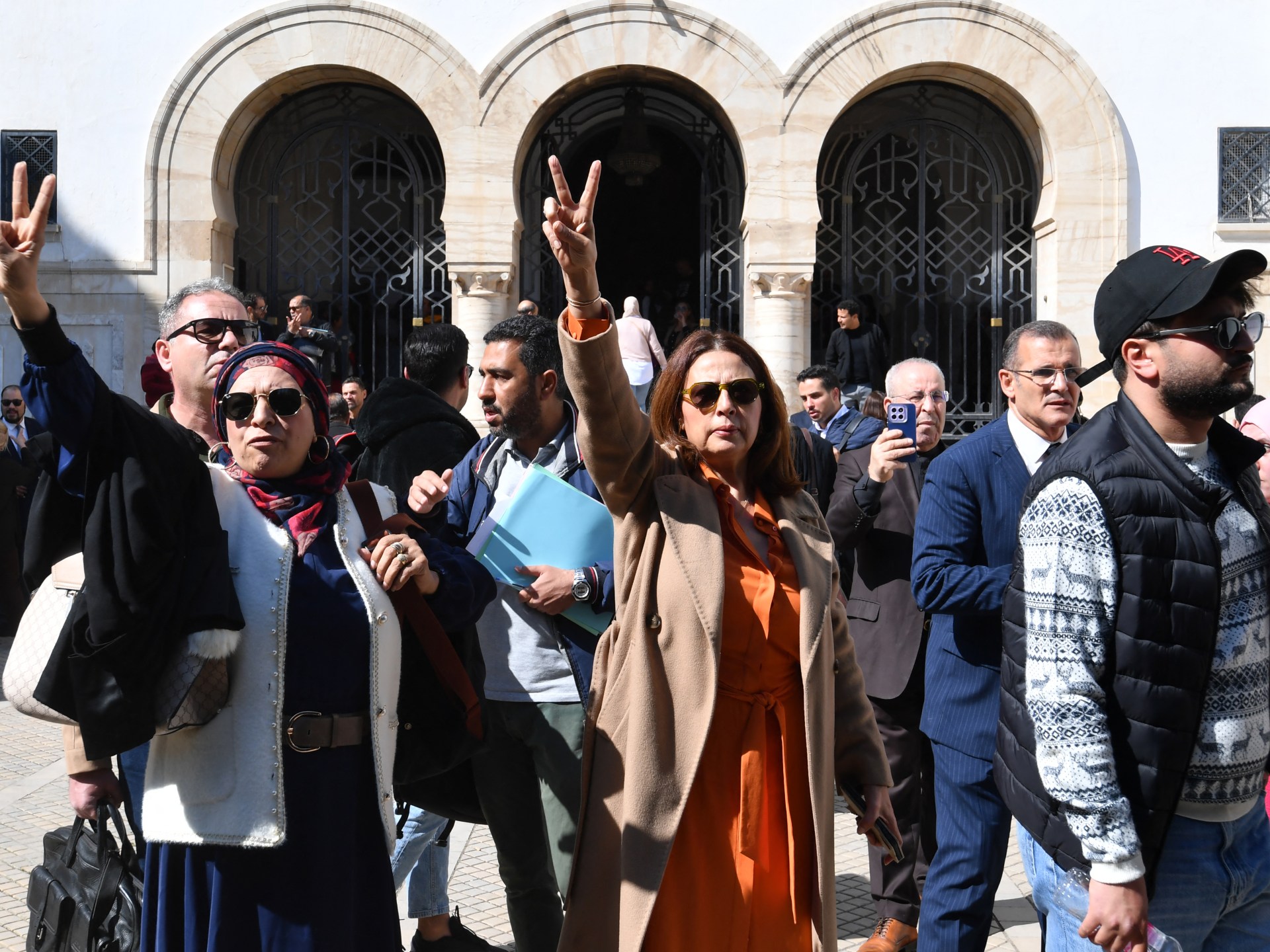
Dozens of defendants found guilty of “conspiracy against state security” and given sentences of 13 to 66 years.
Dozens of opposition figures in Tunisia have been handed lengthy prison terms on national security charges, according to state media.
A number of the North African country’s most senior opposition politicians were among 40 people sentenced on Saturday, including a former justice minister and diplomats. Critics insist the charges are trumped up and say they are symbolic of President Kais Saied’s authoritarian rule.
The TAP state news agency, quoting an unnamed judicial official, reported that the sentences ranged from 13 to 66 years.
An official from the anti-terrorism prosecutor’s office was quoted by Jawhara FM as saying the defendants were found guilty of “conspiracy against state security”, and “belonging to a terrorist group”, including liaising with “foreign powers” to undermine Saied’s rule.
The precise details of the trial remain cloudy, with the exact number of those on trial and the specific charges they face unclear.
It was not immediately clear either on Saturday whether all of the estimated 40 defendants in the case, which has become known as the “conspiracy case” and been running for two years or so, were found guilty and given prison terms.
About 20, many of whom have fled Tunisia, were sentenced in absentia, including the French intellectual, Bernard-Henri Levy, who is accused of being a conduit between defendants and foreign parties.
“President Saied has weaponised Tunisia’s judicial system to go after political opponents and dissidents, throwing people in arbitrary detention on flimsy evidence and pursuing them with abusive prosecutions,” Bassam Khawaja, deputy Middle East and North Africa director at Human Rights Watch, told Al Jazeera earlier this month.
On Friday evening, defence lawyers denounced the trial after the judge finished reading the accusations and began deliberation without hearing from either the prosecution or the defence.
“In my entire life, I have never witnessed a trial like this. It’s a farce, the rulings are ready, and what is happening is scandalous and shameful,” said lawyer Ahmed Souab.
Authorities have accused the defendants, who also include the former head of intelligence, Kamel Guizani, as well as media figures, of attempting to destabilise the country and overthrow Saied.
A number of the defendants – including Issam Chebbi, Ghazi Chaouachi and Jawhar Ben Mubarak – have been in custody since being detained in 2023. Chebbi is a member of the opposition National Salvation Front coalition.
“The authorities want to criminalise the opposition,” Chebbi said on Friday.
Saied rejects accusations that he is a dictator. He said in 2023 that the accused politicians were “traitors and terrorists” and that any judge who would acquit them would be an accomplice.
Saied consolidated his power in 2021 by dissolving the parliament and sacking the then-prime minister.
The opposition leaders involved in the case accused him of staging a “coup”.
They say the charges against them were fabricated to stifle the opposition and establish a one-man, repressive rule.
Some of Tunisia’s most prominent opposition leaders are already in prison.
Rached Ghannouchi, the head of Ennahdha, was arrested in April 2023 and sentenced to one year in prison on charges of incitement.
Earlier this year, he was handed a further 22-year sentence on charges that included plotting against state security. He was also sentenced to three years for accusations that his party received foreign contributions.
Middle East
Deadly, sombre Good Friday as 58 people killed in Israeli attacks on Gaza | Israel-Palestine conflict News
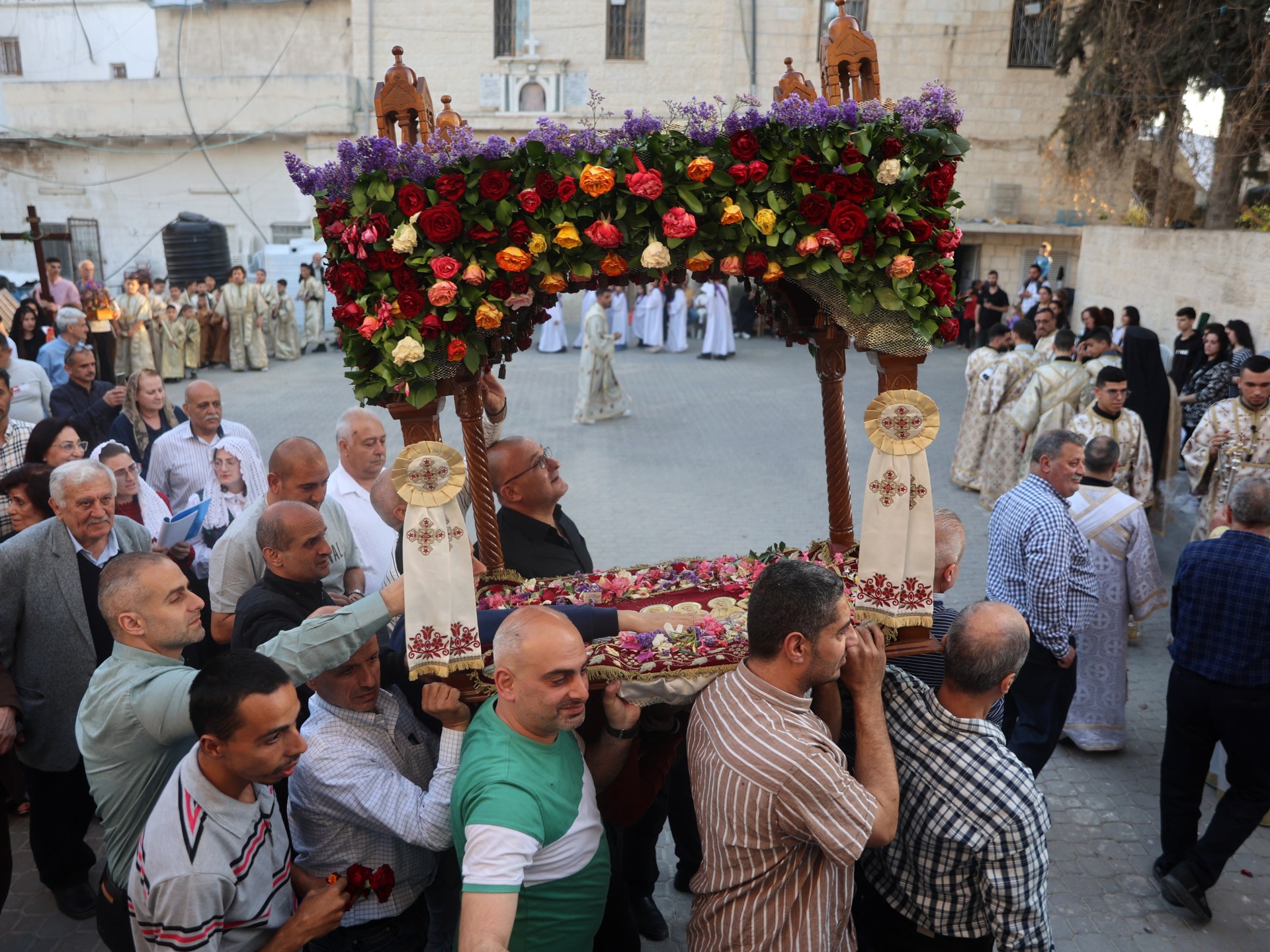
Palestinian Christians in Gaza and the occupied West Bank are holding temperate gatherings leading up to Easter.
Israeli strikes on Gaza have killed at least 58 Palestinians in one day as Christians mark Good Friday in the besieged and bombarded enclave.
More than half of the casualties were in Gaza City and northern Gaza, but deadly attacks took place across the Palestinian Strip, including in Khan Younis and Rafah in the south, medical sources told Al Jazeera on Friday.
The Israeli military said troops were operating in the Shaboura and Tal as-Sultan areas near Rafah, as well as in northern Gaza, where Israel has taken control of large areas east of Gaza City.
On Friday, Israel’s defence minister, Israel Katz, repeated that Israel intended to achieve its war aims.
“The [Israeli army] is currently working towards a decisive victory in all arenas, the release of the hostages, and the defeat of Hamas in Gaza,” he said in a statement.
Palestinian Christians in Gaza however continued to hold temperate gatherings leading up to Easter, amid the attacks.
Speaking to Al Jazeera from a local church, Ihab Ayyad said he used to gather with other congregants and visit his neighbours’ homes every year to celebrate.
“This year, we didn’t make the visits because of the total destruction everywhere, as the [Israeli] occupation forces have levelled most of the houses of my relatives and my neighbours,” Ayyad said. “A lot of my relatives and neighbours were martyred or displaced in different places. We haven’t celebrated because we feel very sad.”
Ramez al-Soury said he used to travel out of Gaza to Bethlehem or Jerusalem for the holy week.
But now, an “atmosphere of war” permeates Gaza. “The death smell is everywhere. The smell of killing and destruction is putting a lot of pressure on us,” he said.
Reporting from Gaza City, Al Jazeera’s Hani Mahmoud said the Christian community is holding onto their faith and has gathered at one of the oldest churches in the world in Gaza – not in defiance but in devotion.
“In Gaza, Good Friday is the power of faith and the quiet strength of those who still believe in peace even when the world around them is nothing but a stage filled with violence and death,” he said.
West Bank settler violence
Rituals to mark Good Friday and Easter have also been held in the occupied West Bank.
There are about 50,000 Palestinian Christians in the region. Israeli authorities, however, require them to acquire permits to travel to Jerusalem, making it difficult for many to join those celebrations.
Moreover, Israeli settlers and the military also attacked Palestinian people on their land in the town of Biddya, in the Salfit governorate in the occupied West Bank, according to Al Jazeera Arabic on Friday, tempering the celebrations.
The Palestine Red Crescent said that a Palestinian was injured in the attack.
Local sources also told Al Jazeera Arabic that dozens of settlers stormed Jabal al-Urma, a hill in the town of Beita in the Nablus governorate, under the protection of the Israeli army.
Settlers are Israeli citizens who live illegally on private Palestinian land in the occupied West Bank and East Jerusalem.
Israeli settler and military violence has soared across the West Bank – particularly in the north of the territory – since the war on Gaza began in October 2023. The United Nations has said this violence has displaced roughly 40,000 Palestinians since Israel began a new military operation in the occupied West Bank in January.
Middle East
Allies say Ghannouchi ‘unjustly’ held, as he marks 2 years in Tunisian jail | Human Rights News
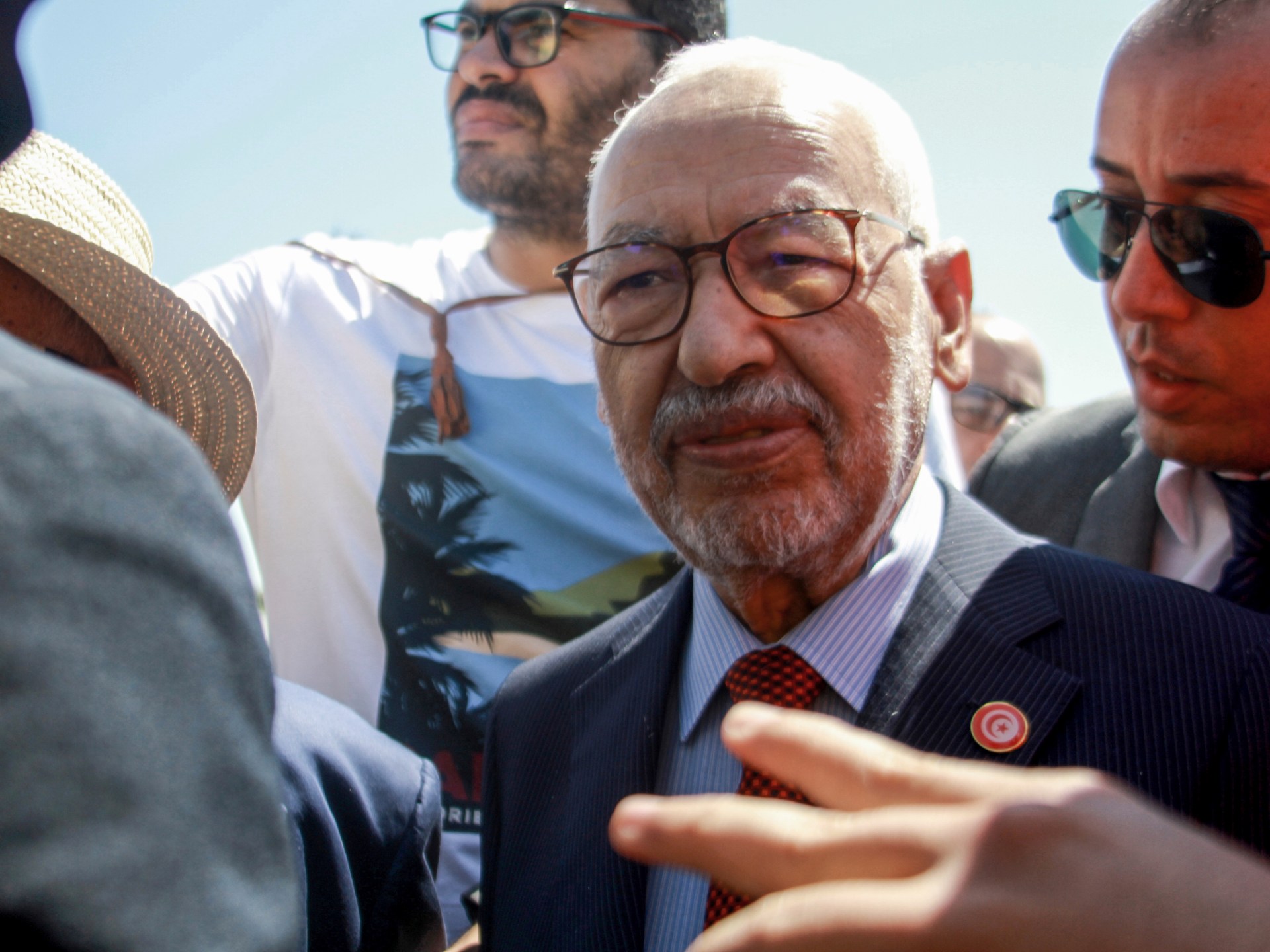
International Committee for Solidarity with Rached Ghannouchi decries ‘repressive campaign’ against Ennahdha party leader.
Marking the second anniversary of the arrest of Tunisia’s prominent opposition leader Rached Ghannouchi, an international committee formed last year to raise awareness about his imprisonment says he is being held “unjustly” and on “trumped-up charges”.
The International Committee for Solidarity with Rached Ghannouchi called for the immediate release of the imprisoned Ennahdha party leader and former speaker of Tunisia’s parliament.
In a statement on Thursday, it said that more than 15 cases have been brought against Ghannouchi, and “several unjust convictions and sentences” have been issued.
The most recent of these was a 22-year prison sentence issued in February on charges that included plotting against state security – a case “to which he has no connection”, the committee said.
Earlier this year, Ghannouchi was also sentenced to three years for accusations that his party received foreign contributions.
The 83-year-old, who has been the main rival of Tunisian President Kais Saied, was arrested in April 2023 and sentenced to one year in prison on charges of incitement.
He has been a vocal critic of Saied, and became the highest-profile figure to be arrested in the continuing consolidation of power by the president who was elected in 2019 and has overseen a wave of repression and legal reforms that have expanded his rule.
“These unjust trials and sentences take place within the context of a widespread repressive campaign led by Kais Saied’s regime, which is targeting opposition voices from all backgrounds, repressing organised action in all its forms, controlling the media and civil society, and silencing critical voices,” the committee said in its statement.
It said Saied’s government has to “exploit the judiciary as a tool for settling political scores”.
‘An era of political prisoners’
The committee’s statement comes just days after United States-based Human Rights Watch (HRW) called on the Tunisian government to halt its crackdown on opposition and free all detainees.
The rights group said arbitrary detention was being used to eliminate dissent in Tunisia amid a trial of prominent opposition figures – including Ghannouchi – on conspiracy charges.
In a report released Wednesday, HRW reinforced opposition leaders’ concern over what they call the authoritarian rule of Saied since he dissolved parliament in 2021 and began ruling by decree.
The opposition described Saied’s move as a coup. He has denied such accusations, professing he would not become a dictator but rather is trying to rescue the North African country from political chaos and rampant corruption.
The report said Tunis had turned arbitrary detention into a cornerstone of repressive policy.
“Saied’s government has returned the country to an era of political prisoners, robbing Tunisians of hard-won civil liberties,” said Bassam Khawaja, deputy Middle East and North Africa director at HRW.
Since 2023, authorities have arrested dozens of prominent political opposition figures as well as journalists, activists and lawyers in a crackdown critics say has undermined the democracy gained in the 2011 Arab Spring popular uprising.
-

 Conflict Zones2 days ago
Conflict Zones2 days agoHaiti in ‘free fall’ as violence escalates, rights group warns | Armed Groups News
-

 Lifestyle2 days ago
Lifestyle2 days agoBelievers say microdosing psychedelics helps them. Scientists are trying to measure the claims
-

 Sports2 days ago
Sports2 days agoJu Wenjun: Chinese grandmaster makes history by winning fifth Women’s World Chess Championship
-
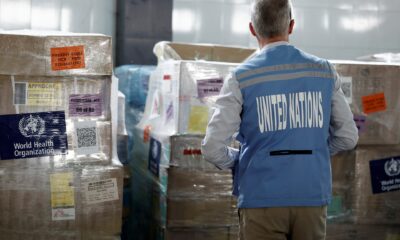
 Middle East2 days ago
Middle East2 days agoHamas accuses Israel of weaponising aid as Gaza’s hunger crisis worsens | Gaza News
-

 Lifestyle2 days ago
Lifestyle2 days agoPicking a team from bars to beam and hoping for 10s: Fantasy leagues in gymnastics are a thing
-
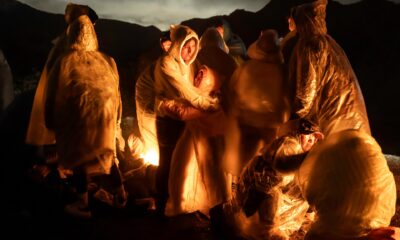
 Middle East2 days ago
Middle East2 days agoPalestinian photographer Samar Abu Elouf wins world’s top photo prize | Gaza News
-

 Sports2 days ago
Sports2 days agoArsenal reaches first Champions League semifinal in 16 years, with Inter Milan also advancing
-
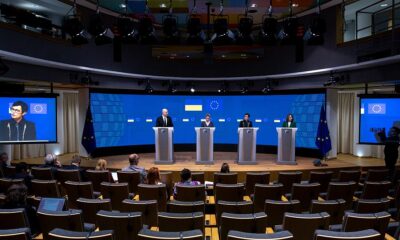
 Africa2 days ago
Africa2 days agoEuropean Union announces new asylum measures



